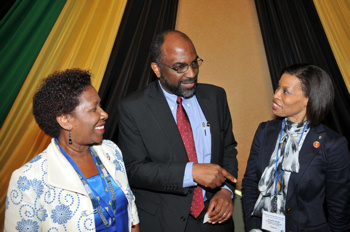Diaspora briefed on Jamaica’s Government’s response to FATCA
MONTEGO BAY, Jamaica – The Government of Jamaica has taken a decision for the country to enter into negotiations with the US Government for a final agreement in respect of the administration of the Foreign Account Tax Compliance Act (FATCA), which was enacted in the United States of America in 2010.
According to Myrtle Halsall, Senior Deputy Governor at the Bank of Jamaica (BOJ), the government has opted to enter into a Model 1 Inter-governmental Agreement (IGA) with the USA.
“The adoption of a Model 1 IGA means that local financial institutions, which must be compliant to FATCA, will make their reports regarding tax information on US persons, to a Jamaican Central Authority,” Mrs. Halsall explained.
The BOJ Senior Deputy Governor made this announcement during a plenary session at the 5th Biennial Jamaica Diaspora Conference held recently at the Montego Bay Convention Centre, in St James, which focused on the Impact of FATCA on Diaspora Investment and Financial Transactions with Jamaica.
She noted that when created, the Authority will be responsible for transmitting FATCA information to the US tax authorities. “The Jamaican Government will also commit to any necessary legislative changes that will ensure that these disclosures do no breach Jamaican law,” she stated.
Earl Jarrett, General Manager of Jamaica National Building Society (JNBS), who was a panelist in the session, welcomed the announcement of the pending agreement.
“This agreement will take some pressure off the Compliance Officers within financial institutions, in terms of the liabilities that they could incur; and the conflict that they may encounter in relation to the Banking Laws in Jamaica,” Mr. Jarrett noted.
He explained that FATCA will have significant implications for all countries and financial institutions in the region, including the approximately 78,000 account holders with US addresses, on the systems of JNBS.
Pamela Watson, CPA and member of the United States Diaspora delegation, acknowledged that FATCA will have far reaching implications for members of the Diaspora who intend to make investments in Jamaica.
“This regulation was developed to close the international tax gap and so in my opinion, it will be implemented very aggressively,” she said, noting that “persons wishing to make investments outside of the US will need to have discussions with their tax advisors to learn more about the disclosure requirements.”

Earl Jarrett (centre), General Manager of Jamaica National Building Society (JNBS), in conversation with Myrtle Halsall, (left) Senior Deputy Governor at the Bank of Jamaica (BOJ) and Allison Peart (right), Managing and Tax Partner with Ernst and Young following their participation in a plenary session at the at the 5th Biennial Jamaica Diaspora Conference.
And, in response to queries about the cost of FATCA to local financial organisations, Mr. Jarrett acknowledged that these will be significant, as “systems will have to be created to ensure that the relevant information is collected and reported, when thresholds are met.”
Mrs. Halsall added that the Government will also enter into discussions with financial institutions in respect of shared costs, related to meeting the requirements of FATCA.
As of January 2013, American citizens will be required to report their foreign financial assets with an overall value of US$50,000. Failure to report these assets within the given timelines will result in the imposition of penalties on the individual.
FATCA also requires Foreign Financial Institutions (FFIs) to report to the IRS, information about financial accounts held by U.S. taxpayers, or by foreign entities in which U.S. taxpayers hold a substantial ownership interest.
Allison Peart, Managing and Tax Partner with Ernst and Young, pointed out that FATCA was a tax on interest, not capital; and “would allow US citizens to receive a credit for any taxes reported, and paid in Jamaica.”


